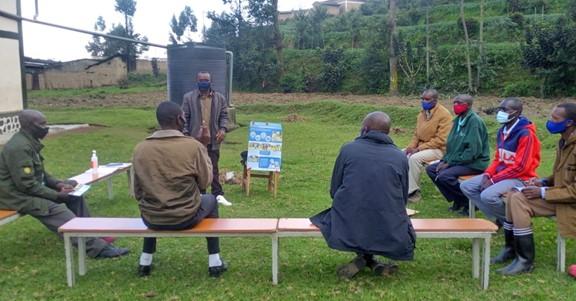Changing behavior within a relatively short timeframe is challenging, but one research study in Rwanda found that involving fathers was helpful for changing their behavior in support of improving the nutrition of their children. After the study’s intervention, children significantly increased their weekly consumption of milk and other animal-source foods. The study also found that fathers significantly increased their knowledge of child nutrition and that they appreciated learning within settings specific to men. The research, funded by USAID through the Feed the Future Innovation Lab for Livestock Systems, was completed in Rwanda in December 2021, and findings are still being analyzed. Initial results are promising.

The Process
This project targeting men followed the success of a similar project by the same principal investigator, Emily Ouma, from the International Livestock Research Institute (ILRI). That previous project focused on mothers, children, and dairy cooperatives, and it showed that properly targeted behavior-change-messaging targeted at women can increase milk consumption by children. It also raised many questions about the roles of Rwanda’s men in raising healthy children (see article and photo essay from CGIAR, Milk and animal source foods can help turn the tide on malnutrition for children in Rwanda).
Often, men are essentially ignored during campaigns to improve the nutrition of children. This study attempted to address that gap and assess the role of fathers and men in relation to food choices within the household. To begin, a formative assessment with 48 key informants helped the researchers define gender norms and roles and to categorize knowledge levels about nutrition. The researchers also selected a small group of “model fathers” who could become guides during the project’s intervention.
As the planned intervention took place from June to October 2021, the ensuing COVID-19 pandemic limited in-person interactions. Even so, fathers wearing masks gathered at open air venues to learn about best practices for feeding infants and young children. Fulgence Ntakirutimana was one of the model fathers who taught other fathers at in-person workshops. He reflected on the experience: “I encourage other men to feed pregnant and lactating women and children a balanced diet. The old mindset needs to change. You might think only a wife should care for children. You should understand that, as a husband, you also have a role in caring for the children.”
The men not only listened to this advice, but they also acted upon it.

Did They Remember?
Follow-up surveys with workshop participants found that knowledge increased significantly, for example, about when to provide children with cow’s milk. Joint decision making between mothers and fathers about feeding home-produced milk to children also increased. More than 95% of fathers who participated in community meetings or received text messages about milk recalled the project’s three key messages about giving animal-source foods to children. Children in their households became more likely to consume milk, eggs, or meat at least twice a week.
Continuing the Work on Gender
One output from this project is a facilitator’s guide published by ILRI: Engaging men in supporting maternal and child consumption of milk and other animal source foods in Rwanda. It provides a template for a three-day workshop.
Other research results have been submitted to peer-reviewed journals. These articles will complement the previous project’s two journal articles, blogs, and other outreach. Together, the two projects led by Dr. Ouma provide considerable insight into family-based nutrition education that engages both women and men.
 2
2
